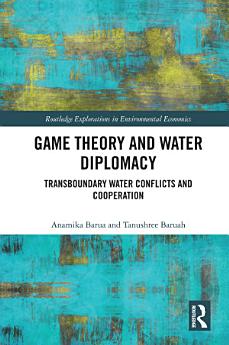Game Theory and Water Diplomacy: Transboundary Water Conflicts and Cooperation
About this ebook
This book shows that the strategic interaction between the parties in these negotiations can be fruitfully analysed using the tools and techniques of game theory. After an introduction to game theory and the relevant models, the book explores three key cases from South Asian river basins – Indus, Brahmaputra, and Ganges. Every river basin is unique; options and choices available for negotiations are context specific. Therefore, there is no single path or ‘one size fits all’ transboundary interaction. The choice and the strategies a nation state adopts to gain the most preferred outcome depend on the choices and the strategies the other state is making. Thus, the book examines the specifics of each case – including the role of geographical position, power relation, policies (internal and external), access to information, rationality, as well as third-party intervention in a negotiating state’s position during transboundary interaction – and explores what the application of game theory can reveal about each of the parties, their positions, and the strategies for achieving their goals.
This book is essential reading for researchers in water economics, water diplomacy and conflict, water security, and South Asian studies.
About the author
Anamika Barua, Professor of Ecological Economics at IIT Guwahati, India, is a leading expert in water governance, climate change, and transboundary cooperation. Holding a PhD from the University of Leeds, she has spearheaded several high-impact international projects on water resources. Dr Barua has published extensively in top academic journals and serves on editorial boards of leading publications. Her work bridges science, policy, and diplomacy, with a focus on the Brahmaputra River Basin. Committed to fostering sustainable and equitable water management, Dr Barua’s contributions continue to shape national and international policies on water and climate governance.
Tanushree Baruah, Assistant Professor of Economics at Cotton University, Guwahati, India, holds a PhD from IIT Guwahati. Her research interests span developmental and environmental issues, transboundary water governance, game theory, hydro-diplomacy, and climate change. Dr Baruah’s publications are in high-impact scientific journals. Born and brought up by the Brahmaputra River in Guwahati, Assam, her deep-rooted connection with the region’s complex ecological and geopolitical landscape has been a major inspiration for this book. In addition to her scholarly pursuits, she is passionate about writing and travelling, which continually enrich her perspectives and inform her research and creative work.




